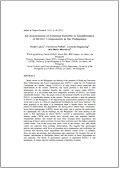| Journal Article |
 |
|
| Article Title | An Assessment of Potential Benefits to Smallholders of REDD+ Components in the Philippines | | Author | Rodel D. Lasco, Florencia B Pulhin, Leonida Bugayong and Marlo Mendoza | | Year | 2011 | | Journal Title | Annals of Tropical Research | | Institution | Visayas State University | | Volume | 33 | | Issue | 1 | | Pages | 31–48 | | Call Number | JA0428-12 | | Keywords | climate change mitigation, REDD, forest conservation, climate policy |
|
| Abstract: |
| Many sectors in the Philippines are looking at the potential of Reducing Emissions
from Deforestation and Forest Degradation-plus (REDD+) under the UN Framework
Convention on Climate Change (UNFCCC) to help finance forest protection and
rehabilitation in the country. However, one major problem is that there is little
information on the potential benefits the country can expect under REDD+.
Specifically, it is not known how each component activities of REDD+ can benefit
smallholder farmers. Thus, this paper assesses the potential benefits of activities under
REDD+ to smallholder farmers in the country. The key question is what the potential
of REDD+ in the Philippines is for improving the sequestration potential of the forest
sector and to serve as a form of supplemental livelihood for rural forest dwellers? The
main approach of the paper is to summarize what is known about: the historical
pattern of deforestation and degradation, the driving forces behind them, communitybased
forest management (CBFM), tenure and rights, and to analyze the implications
of Copenhagen and Cancun meetings for the Philippines. The main finding of the
study is that depending on which REDD+ activity is implemented, smallholder
farmers under CBFM areas would have varying roles and potential benefits.
Smallholder farmers will benefit the most from avoiding forest degradation and
enhancing of forest stocks activities because these activities pose the highest potential
carbon credits. Due to the rising total forest cover of the country, very few carbon
credits are expected from avoiding deforestation. This implies that government
policies and programs could focus on preparing local communities and institutions for
activities that decrease forest degradation and enhance carbon stocks. In addition,
there are many uncertainties and information gaps remaining. For example, the rate of
biomass degradation in Philippines forests and the drivers of forest degradation are
still unknown. The ability of government agencies to implement REDD+ is still
inadequate. A strong capacity building program is therefore essential. |
|
|
Download file(s): Click icon to download/open file.
|
|
|
|
GRP 5: Improving the ability of farmers, ecosystems & governments to cope with climate change
|
| Viewed in 2364 times. Downloaded in 0 times. |
